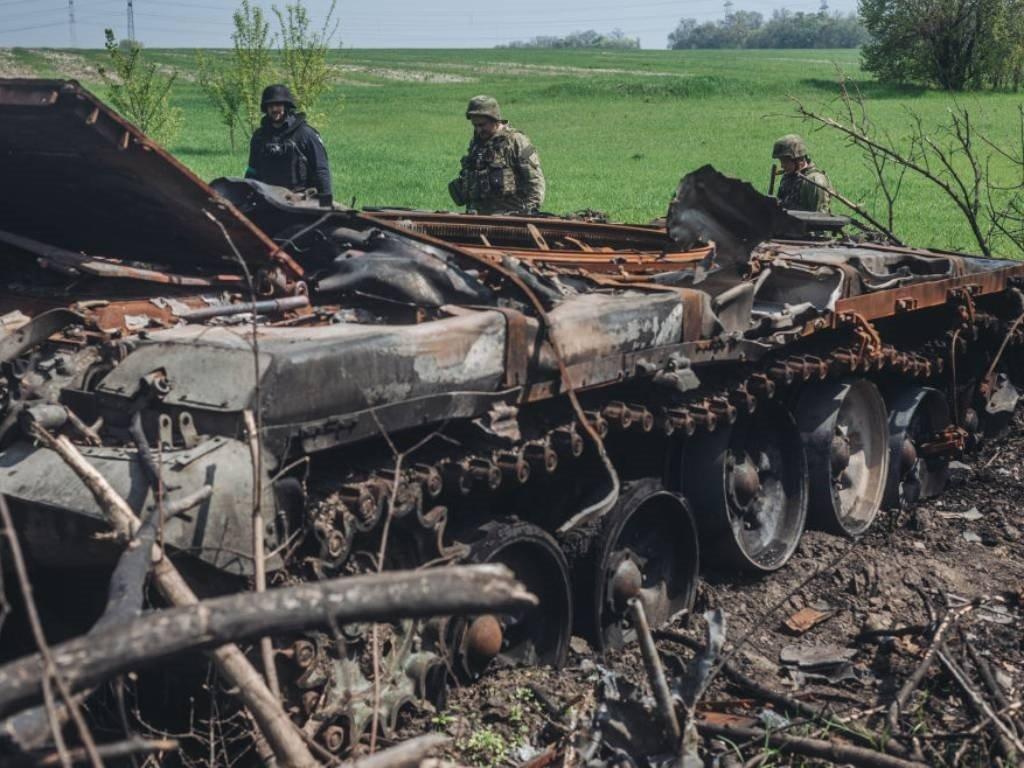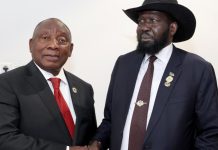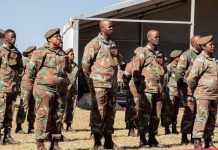Africa-Press – South-Africa. Russia and Ukraine are mere actors in the bigger stage of shifting global politics, writes Oscar van Heerden. He explains that this story is geopolitics at its best.
Let me open this article with a few unequivocal statements pertaining to the war in Ukraine.
1) War is awful. The devastation to the people in Ukraine and civilian casualties is an atrocity.
2) Racist treatment of black immigrants in Ukraine is unacceptable. The unparliamentary, or should I say racist, language has already found its way into the vocabulary of news reporters, pundits and indeed government officials from various European governments. Talking about “these are people like us”, “blonde hair and blue eyes”, Christian folks as opposed to non-believers or barbarians with dark hair and dark eyes in other places such as Afghanistan, Syria, Iraq, and Africa, is to be abhorred.
3) Sovereign nation-states should not be invaded by other states. The sovereignty of the state is to be upheld. Invasions for whatever reason – for regime change or for expansion – should not be tolerated. This holds true for Russia’s behaviour and equally for the actions by the United States, France, the United Kingdom and other nation-states in recent times.
I take all these statements as given. The argument I now present below in no way sets out to deviate from, or undermine, these fundamental truths.
In the Realist International Relations paradigm, war is the extension of politics by other means. What is the story behind “the war in Ukraine” or behind “the Russian invasion of Ukraine”?
The dominant story appears to be simple: The big, bad and dangerous Russia (who have nuclear weapons) are wantonly expanding their territory into Ukraine. They are violating international law and invading their neighbour Ukraine, under the leadership of an apparently deranged Valdimir Putin. Therefore, it is justified to supply weapons to Ukraine and use the Western control of financial systems to hurt the Putin regime.
Russia must be punished. Russians who have their money in offshore banks have had to contend with various governments wanting to freeze their money. It appears that all Russian’s money is illegitimate and/or has been obtained through nefarious means.
If you are Russian and you have money in foreign banks, western governments may lay claim to it immediately. The West is justified in freezing certain bank accounts, it seems.
The West can simply take the money of others, stop SWIFT credit card systems, and initiate trade sanctions. The West is justified in removing Russia from the SWIFT banking system, or is it not? The dollar is still the international currency.
EXPLAINER: What is SWIFT – the global finance arm that the West is twisting against Russia
The World Bank, International Monetary Fund (IMF) and World Trade Organisation (WTO) remain in the hands of the West. These global financial systems can and will be manipulated to suit Western interests, it seems. The West is justified in lending support to the Ukrainian government in the form of sophisticated military weapons and money to continue the destruction and the death toll. Selling of military arms continues unabated to Ukraine, encouraging that country to continue a war at its own expense and at the expense of its people. Millions of which have now been displaced in neighbouring countries.
This story is a classic International Relations example of how a great power uses favoured regional powers to check the rise of potentially hostile powers. It is ‘off shore balancing’ which has been invoked by the US.
What does Ukraine crisis reveal about geo-politics?
What are the counter-narratives? What does the war in Ukraine revealing about our current geo-politics?
We first need to take a few steps back to grasp the alternative story.
I first take you back to the end of the Second World War and the establishment of North Atlantic Treaty Organisation (NATO). Remember who belongs to NATO. Who funds it? Whose interests does NATO represent? Are these some of the same people who have special status in the United Nations? Are these some of the same people who have veto powers and permanent seats in the UN Security Council? Are these the good guys, or perhaps the global bullies? You decide. For the sake of brevity, let’s call the NATO beneficiaries by in large, “the West”, with the US as its leader, shall we?
OPINION: Sipho Masondo – Analysing Russia’s reasons for invading Ukraine — what role did NATO play?
And now – importantly – who is not part of NATO? Which of the big global players are not in the NATO club? Some of whom does not have a permanent seat in the UN Security Council? Who does not have veto powers in the UN? Think all Muslim states, South America, Africa, India, Brazil. Let’s call those not in NATO, “the Others”, with China and Russia (though UNSC members) as its leaders, shall we?
Now, knowing who NATO is and how it came about, I take you back to 2008 and another expansion of territory: This time, not Russian expansion, but NATO expansion. Oh, and by the way, the West has made global commitments to not expand NATO. Those commitments were broken. Poland, Hungary and Czech Republic have all joined. The latest talk has been of Ukraine wanting to join NATO.
NATO military expansion
Would the USA allow a military base of “the others” on its doorstep? No. Would Russia allow a NATO military base of “the West” in Ukraine? No. Fair is fair, right? In this narrative, Russia is justified in preventing NATO expansion to Ukraine. Russia envisages Ukraine as having ‘strategic autonomy’. Ukraine should remain a neutral zone – and not join NATO.
How is Russia responding to the financial and trade sanctions? Russia is not operating on its own, lying back and taking its punishment. It is acting to oppose and further weaken the Western hegemony. This is evident in three key examples.
The first example pertains to the its response to no longer being able to use the SWIFT banking system. Instead of it hurting Russia (in the short term only), Russia and China have come together and agreed to challenge this global system managed by the West. A Russian equivalent system designed by the Russian central bank called the System for transfer of financial messages (SPFS) and a Chinese system, which is called the Cross border interbank payment system (CIPS), are in talks to integrate the two so as to be a counterweight or counterbalance to the SWIFT system.
ANALYSIS: Ukraine war follows warnings that NATO expansion into Eastern Europe could provoke Russia
The second example pertains to the position and strength of the US dollar. The petrodollar is now under attack, with Russia now saying that all oil purchases can be concluded in local currencies and not the agreed-upon US Dollar any longer.
As the fourth-largest oil producer Russia has just reset a 50-year-old agreement internationally (in which it was agreed that all oil transactions must be concluded in US Dollars). Saudi Arabia and other Gulf States have accepted Russia’s demand to reverse this and allow for trading in local currencies. So, the US and its hold on the oil market has now been broken after almost 50 years.
The final example is the threat by Putin to retaliate if the West enforces a no-fly zone and/or target the gas and oil lines to certain European countries. Such retaliation, in my opinion, will be to escalate this war towards Poland, and other NATO members. This will force NATO to invoke article 5 and come to the aid militarily of its member states. This will then mean all-out war with Western boots on the ground. A war that would mean more causalities, death and destruction.
Message to China
Is the West’s message of supplying weapons to Ukraine, trade sanctions and financial restrictions only intended for Russian ears? Is Russia a lone wolf in this story?
I think not. In my opinion, the West’s response to the Russian invasion of Ukraine holds a message for other members of “The Others”. The message is clearly also to China: Try your luck to challenge The West’s global hegemony and you will suffer the same consequences like Putin’s Russia. So, listen carefully, “You had better watch it Mr Dragon and stay in your lane”. Is the West trying to tell China, “You just think of invading Taiwan, and you will suffer the same fate as your Russian friend”.
This message or warning is likely being met with some sniggers and scepticism far East. The US as leader of the West is no longer what it was. Its hegemony is in question and its empire is waning.
ANALYSIS: Aglaya Snetkov and Marc Lanteigne – Ukraine crisis – Why China is not bailing out Russia
As we know, China has always had a none interference policy. It hardly expresses itself on such global matters and certainly does not get involved in military operations offshore. But with the realignment of the global hegemonic power balance and a declining global hegemon desperately wanting to exert its waning hegemony, what does a China do? I assume since I have not lived through a falling empire period, I don’t know what such an empire gets up to when it is evident that its hegemony is quickly running out of steam. It must be such a difficult pill to swallow and even more difficult to accept.
Is the US still a global superpower?
Such are the events of the past few months in Ukraine, a show of force and influence that may very well determine whether the US is still seen as a global superpower or not. After all, we all still very vividly recall how the mighty US, just months ago, left Afghanistan with its tail between its legs after almost ten years of fighting a none conventional opposition in the mountains of that country.
I think the war in Ukraine and the desperate steps taken by The West to curtail Russia, is really a story of the formation of a new world order. This is not just about Ukraine. It is not just about Russia. These are mere actors in the bigger stage of shifting global politics. This story is geopolitics at its best. I believe we are seeing a new world order playing out in front of our eyes.
– Dr Oscar van Heerden is a scholar of International Relations (IR), where he focuses on International Political Economy, with an emphasis on Africa, and SADC in particular. He is currently the Deputy Vice Chancellor at the University of Fort Hare.
For More News And Analysis About South-Africa Follow Africa-Press






